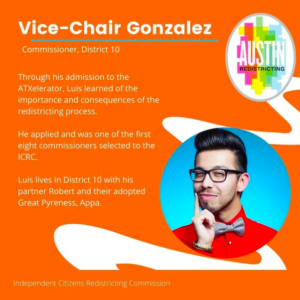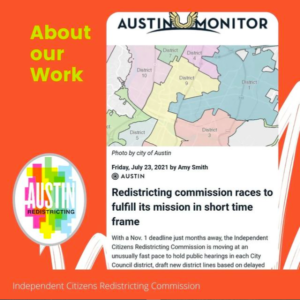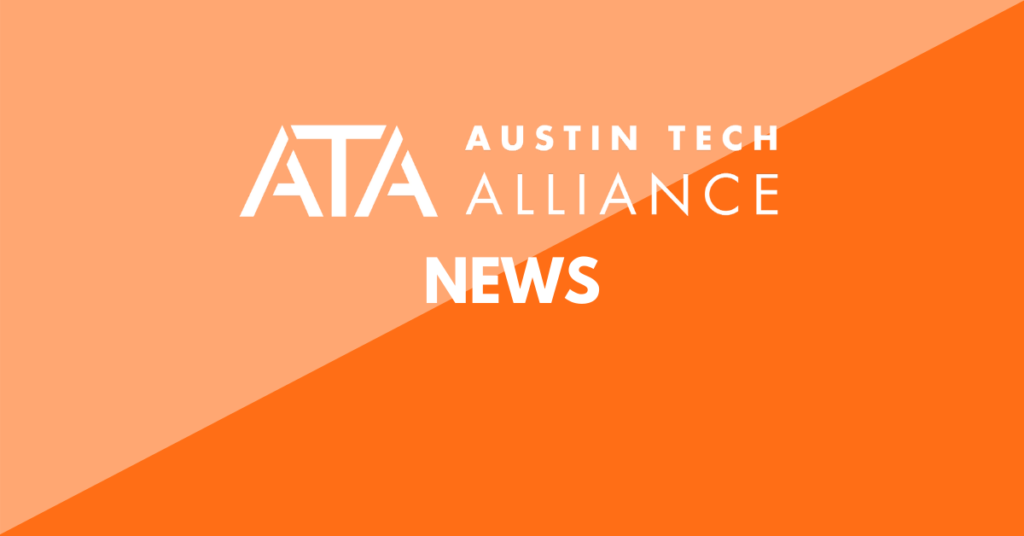 Austin has a process for residents to redraw the boundaries of the council districts every ten years. The boundaries of the council districts greatly impact Austin’s government, including our 10 Councilmembers and Mayor, and will shape how residents are represented for the next decade.
Austin has a process for residents to redraw the boundaries of the council districts every ten years. The boundaries of the council districts greatly impact Austin’s government, including our 10 Councilmembers and Mayor, and will shape how residents are represented for the next decade.
It’s time for Austin residents to redraw the council district boundaries, so ATA is chatting with the Austin residents on the Commission that have the responsibility of drawing the district boundaries through an open and impartial process.
Up next: Luis Gonzalez, Vice Chair Independent Citizens Redistricting Commission
What inspired you to apply for a Commissioner position with the ICRC and what inspires your desire to be involved in local politics?
In 2020, I applied and was selected as a member of the ATXelerator cohort. The ATXelerator’s mission is to identify and prepare future-focused leaders for public service, specifically to serve on the city council, and educate the community about solutions that will improve Austin’s quality of life for generations to come. The program taught me the inner workings of the city: from how utilities and toll roads function to solutions to support our neighbors experiencing homelessness. I also learned of the importance and consequences of redistricting on the state and city level.
Shortly after the early end of the program (the COVID-19 impact), I noticed the application announcement for the Independent Citizens Redistricting Commission. I was tired of complaining about the injustice and inequities. I viewed this commission as one way to actually do something to right the wrongs. I applied, was identified as a “qualified” candidate, and was lucky enough to be one of the first 8 randomly selected commissioners. While my spot on the commission now prevents me from running for city office for 10 years, I hope it gives me the time to effectively craft my message and priorities. I know now though, redistricting and equitable representation on the city level will be one of those priorities.
What are your general priorities for this upcoming redistricting session?
If anything was simple about the ICRC and our work, is that we are sort of bound by a certain set of criteria and priorities laid out by the city charter. The number one priority: ensuring each district has a reasonably equal population. With the rapid population growth we’ve experienced in Austin over the decade, we see the ideal population of each district hovering just below 100,000 residents. My second priority is to ensure that as many Austin residents are heard throughout this process. That is why the ICRC is holding
public input forums in each of the districts. We will have completed five of those opportunities come Saturday, July 31, with seven more opportunities still to come. We’d appreciate
your support in advertising these forums.
 What do you believe are the biggest issues the people of Austin are facing right now, and how do you think redistricting can help or hurt?
What do you believe are the biggest issues the people of Austin are facing right now, and how do you think redistricting can help or hurt?
The housing market. The mix of rapid population growth and rising housing costs are forcing people out of the city and changing the racial/ethnic make-up of Austin. We must be transparent and honest about this issue. I believe redistricting and the work of the ICRC can help resolve this issue though. It won’t resolve the desire of others to want to move to the city, thereby continuing our precipitous growth, but it will help ensure that those affected can continue to vote for a city council representative that will fight for them and ensure they are heard.
What do you think is the best way Austinites to get involved in local politics?
Get engaged or stay engaged. When you see an opportunity to make your voice heard, as is the opportunity we are giving Austin residents at each one of our public forums, do all you can to ensure your thoughts and needs are preserved for the public record. In addition, while it might be difficult to take up an unpaid commission position that acts as a second full-time job, especially if you have a family to care for or are going back to school, seize and make the most of the opportunity. Serving as the Vice Chair of the ICRC has been difficult work, but it has been an honor to represent the city, specifically the residents of District 10 where I currently reside.
How does or might the city partner with local businesses or tech companies to make the city function optimally? How can technology help Austin return to more normalcy?
I’m speaking as a commissioner of the ICRC. We are independent from the city, with a capital “I”. The ICRC can work with local businesses and tech companies to spread our work and ensure as many people know and attend opportunities for public input, input that will help shape the decisions of a particular board or commission. We should have tapped on both resources early on, but when you are trying to map out a forum schedule in the midst of an ongoing pandemic, onboard staff, navigate the working style and schedules of 14 strangers, some critical needs unfortunately get lost. I will say, we’ve quickly learned that social media is a commission’s best friends in regard to spreading the word.
If you’d like to reach the ICRC, contact them here with feedback and comments: icrc.commissioners@austintexas.gov.


